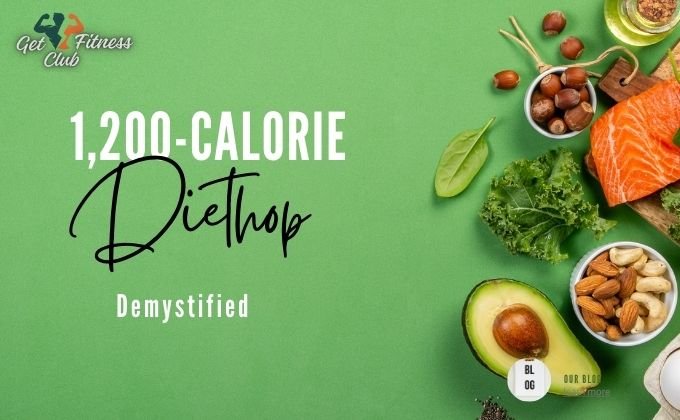Embarking on a journey towards a healthier lifestyle often involves demystifying the intricacies of our daily diet. Ever wondered, 1,200-Calorie Diet Demystified This question isn’t just about numbers; it’s a gateway to understanding the balance between nutrition and portion control. Imagine savoring delicious meals while keeping a close eye on calories. In this exploration, we’ll unravel the secrets of a 1,200-calorie diet, guiding you through a day’s worth of nourishment. It’s not about deprivation; it’s about making informed choices that empower your well-being. Join us on this insightful journey to discover a balanced and achievable approach to mindful eating.
What Does a 1,200-Calorie Diet Look Like:
Embarking on a 1,200-calorie diet requires careful planning and consideration to ensure you meet your nutritional needs while managing your calorie intake. Here’s a guide to help you navigate a day on a 1,200-Calorie Diet Demystified.
How to Calculate Your Daily Calorie Goal:
Before diving into the specifics of a 1,200-calorie diet, it’s crucial to determine if this calorie level aligns with your individual needs. Factors such as age, gender, activity level, and health goals influence your daily calorie requirements. Use online calculators or consult with a nutritionist to establish a personalized calorie goal.
The Best Meal-Prep Containers:
Efficient meal preparation is key to success on a 1,200-Calorie Diet Demystified. Invest in reliable meal-prep containers to streamline the process and make it easier to adhere to your dietary plan, especially when you’re on the go.
Breakfast on a 1,200-calorie Meal Plan:
A nutritious breakfast sets the tone for the day. Aim for a balance of protein, healthy fats, and carbohydrates to keep you satisfied. Here’s a sample breakfast:
Sample Breakfast:
Spinach and tomato scrambled eggs (250 calories)
Whole-grain toast (80 calories)
Greek yogurt with berries (120 calories)
Black coffee or herbal tea (0 calories)
Morning Snack:
A mid-morning snack can help curb hunger and maintain energy levels. Opt for nutrient-dense options that contribute to your daily nutritional requirements.
Sample Snack:
Apple slices with almond butter (150 calories)
Lunch on a 1,200-calorie Meal Plan
Lunch should be a well-balanced meal, incorporating lean proteins, vegetables, and complex carbohydrates.
Sample Lunch:
Grilled chicken breast salad with mixed greens, cherry tomatoes, cucumbers, and balsamic vinaigrette (400 calories)
Afternoon Snack
Another snack in the afternoon can prevent overeating during dinner and keep your metabolism active.
Sample Snack:
Carrot sticks with hummus (100 calories)
Dinner on a 1,200-calorie Meal Plan
Dinner should be a satisfying and nutritionally dense meal without exceeding your calorie limit.
Sample Dinner:
Baked salmon with quinoa and steamed broccoli (450 calories)
Maintaining Long-Term Health:
While a 1,200-calorie diet can be effective for short-term goals, it’s essential to prioritize nutrient density. Include a variety of fruits, vegetables, lean proteins, and whole grains to ensure you get the vitamins and minerals your body needs for optimal health.
Success Stories:
Celebrating success stories can provide motivation and inspiration. Connect with others who have followed a 1,200-calorie diet successfully, and consider seeking guidance from a healthcare professional or registered dietitian to ensure your approach is safe and sustainable.
The daily total is 1,208 calories, 60 grams of protein, 158 grams of carbohydrates, 38 grams of fiber, 45 grams of fat, and 1,190 milligrams of sodium.
Remember, individual nutritional needs vary, and it’s crucial to listen to your body. If you have any health concerns or specific dietary requirements, consult with a healthcare professional or registered dietitian for personalized advice.
Conclusion:
In summary, a 1,200-calorie diet requires careful planning, emphasizing nutrient-dense foods and balanced meals. While the provided sample day offers a glimpse into this approach, it’s crucial to tailor it to individual needs. Success depends on realistic expectations, strategic meal preparation, and a commitment to long-term health. Consult with healthcare professionals for personalized advice, and remember that nutritional quality is key to achieving sustainable and healthy outcomes.
FAQS:
Q1:How much weight will I lose on 1200 calories a day?
The amount of weight you’ll lose on a 1200-calorie-per-day diet can vary depending on factors like your current weight, metabolism, and activity level. Generally, a caloric deficit is needed to lose weight, and a daily intake of 1200 calories is considered low. However, it’s important to ensure that you are meeting your nutritional needs and not compromising your health. It’s recommended to consult with a healthcare professional or a registered dietitian before starting such a restrictive diet.
Q2:What can I eat for 1200 calories a day?
For a 1200-calorie-a-day meal plan, focus on nutrient-dense foods such as lean proteins, vegetables, fruits, and whole grains. Portion control is crucial to ensure you get a balance of essential nutrients.
Q3:How many calories should breakfast be on a 1200-calorie diet?
As for breakfast on a 1200-calorie diet, it’s advisable to include a mix of protein, healthy fats, and carbohydrates. Examples include a small omelet with veggies, Greek yogurt with berries, or whole-grain toast with avocado.
Q4:What is the 7-day challenge diet?
The “7-day challenge diet” is a term that can refer to various diets or meal plans designed to be followed for a week. These challenges often claim to promote weight loss or detoxification. However, the effectiveness and safety of such diets can vary, and it’s important to approach them with caution. Rapid or extreme weight loss methods may not be sustainable or healthy in the long run. Before undertaking any specific diet plan, it’s recommended to consult with a healthcare professional or a registered dietitian to ensure it meets your individual nutritional needs.



